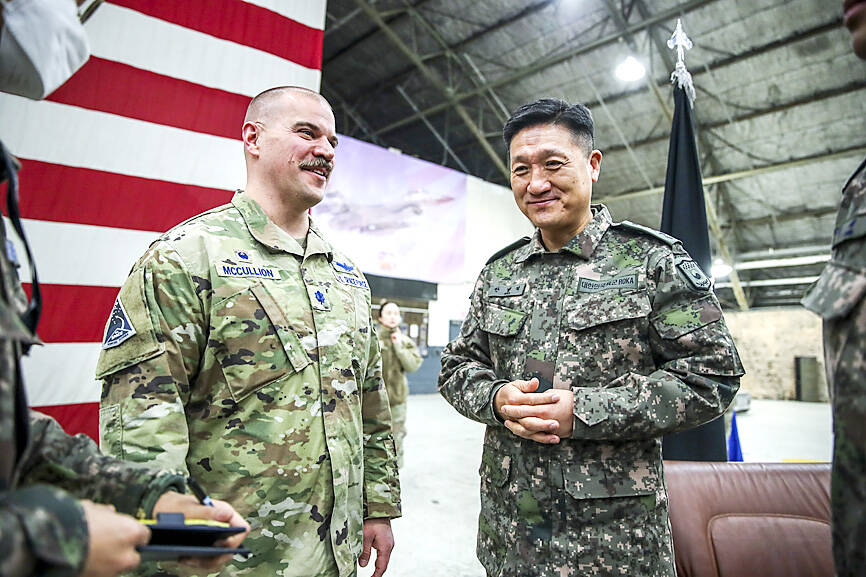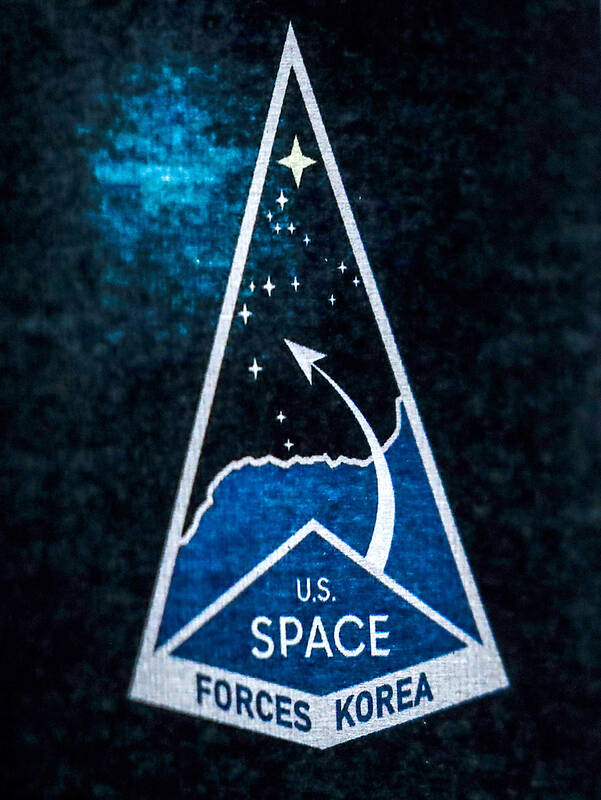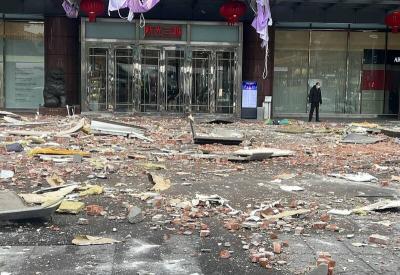US Forces Korea yesterday launched a new space force unit, as Washington and Seoul ramp up efforts to better counter North Korea’s evolving nuclear and missile threats.
US Space Forces Korea is the second overseas space component of the US Space Force, and is tasked with monitoring, detecting and tracking incoming missiles, as well as bolstering the US military’s overall space capability.
It is to be led by Lieutenant Colonel Joshua McCullion, the US Forces Korea said.

Photo: EPA-EFE
General Paul LaCamera, commander of the sub-unified command of the US Indo-Pacific Command, said the unit would enhance the US’ ability to ensure peace and security on the Korean Peninsula and in Northeast Asia.
“The US military is faster, better connected, more informed, precise and legal because of space,” LaCamera told a ceremony at Osan Air Base in Pyeongtaek, South Korea.
Seoul and Washington are seeking to boost security cooperation to deter North Korea, which earlier this year tested intercontinental ballistic missiles capable of reaching the US mainland.

Photo: EPA-EFE
The South Korean Air Force this month also set up its own space unit, saying it would bolster its space power and operation capability together with the US Space Force.
US officials have expressed concerns over rising security activity in space by major rivals, including China’s development of hypersonic weapons and Russia’s test of anti-satellite technology last year.
Beijing has warned Seoul against joining a US-led global missile shield, and criticized that THAAD US missile defense systems are installed in South Korea.
The South Korean Ministry of National Defense said the creation of the US space component had nothing to do with South Korea’s participation in existing missile defense programs.
About 28,500 US troops are stationed in South Korea under a mutual defense treaty forged after the 1950-1953 Korean War ended in an armistice, not a peace treaty.
The US Indo-Pacific Command and Central Command set up their space units last month in Hawaii and Florida respectively.

UPDATED (3:40pm): A suspected gas explosion at a shopping mall in Taichung this morning has killed four people and injured 20 others, as emergency responders continue to investigate. The explosion occurred on the 12th floor of the Shin Kong Mitsukoshi in Situn District (西屯) at 11:33am. One person was declared dead at the scene, while three people were declared deceased later after receiving emergency treatment. Another 20 people sustained major or minor injuries. The Taichung Fire Bureau said it received a report of the explosion at 11:33am and sent rescuers to respond. The cause of the explosion is still under investigation, it said. The National Fire

ALL-IN-ONE: A company in Tainan and another in New Taipei City offer tours to China during which Taiwanese can apply for a Chinese ID card, the source said The National Immigration Agency and national security authorities have identified at least five companies that help Taiwanese apply for Chinese identification cards while traveling in China, a source said yesterday. The issue has garnered attention in the past few months after YouTuber “Pa Chiung” (八炯) said that there are companies in Taiwan that help Taiwanese apply for Chinese documents. Minister of the Interior Liu Shyh-fang (劉世芳) last week said that three to five public relations firms in southern and northern Taiwan have allegedly assisted Taiwanese in applying for Chinese ID cards and were under investigation for potential contraventions of the Act Governing

‘INVESTMENT’: Rubio and Arevalo said they discussed the value of democracy, and Rubio thanked the president for Guatemala’s strong diplomatic relationship with Taiwan Guatemalan President Bernardo Arevalo met with US Secretary of State Marco Rubio in Guatemala City on Wednesday where they signed a deal for Guatemala to accept migrants deported from the US, while Rubio commended Guatemala for its support for Taiwan and said the US would do all it can to facilitate greater Taiwanese investment in Guatemala. Under the migrant agreement announced by Arevalo, the deportees would be returned to their home countries at US expense. It is the second deportation deal that Rubio has reached during a Central America trip that has been focused mainly on immigration. Arevalo said his

‘SOVEREIGN AI’: As of Nov. 19 last year, Taiwan was globally ranked No. 11 for having computing power of 103 petaflops. The governments wants to achieve 1,200 by 2029 The government would intensify efforts to bolster its “Sovereign Artificial Intelligence [AI]” program by setting a goal of elevating the nation’s collective computing power in the public and private sectors to 1,200 peta floating points per second (petaflops) by 2029, the Executive Yuan said yesterday. The goal was set to fulfill President William Lai’s (賴清德) vision of turning Taiwan into an “AI island.” Sovereign AI refers to a nation’s capabilities to produce AI using its own infrastructure, data, workforce and business networks. One petaflop allows 1 trillion calculations per second. As of Nov. 19 last year, Taiwan was globally ranked No. 11 for